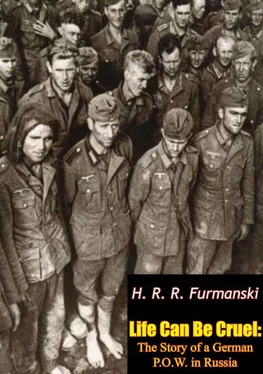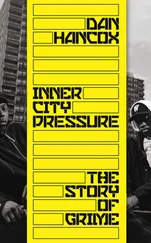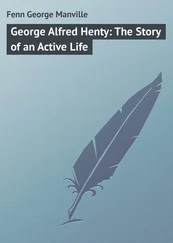H. Furmanski - Life Can Be Cruel - The Story of a German P.O.W. in Russia
Здесь есть возможность читать онлайн «H. Furmanski - Life Can Be Cruel - The Story of a German P.O.W. in Russia» весь текст электронной книги совершенно бесплатно (целиком полную версию без сокращений). В некоторых случаях можно слушать аудио, скачать через торрент в формате fb2 и присутствует краткое содержание. Год выпуска: 2016, Издательство: Pickle Partners Publishing, Жанр: Биографии и Мемуары, military_history, на английском языке. Описание произведения, (предисловие) а так же отзывы посетителей доступны на портале библиотеки ЛибКат.
- Название:Life Can Be Cruel: The Story of a German P.O.W. in Russia
- Автор:
- Издательство:Pickle Partners Publishing
- Жанр:
- Год:2016
- ISBN:нет данных
- Рейтинг книги:5 / 5. Голосов: 1
-
Избранное:Добавить в избранное
- Отзывы:
-
Ваша оценка:
- 100
- 1
- 2
- 3
- 4
- 5
Life Can Be Cruel: The Story of a German P.O.W. in Russia: краткое содержание, описание и аннотация
Предлагаем к чтению аннотацию, описание, краткое содержание или предисловие (зависит от того, что написал сам автор книги «Life Can Be Cruel: The Story of a German P.O.W. in Russia»). Если вы не нашли необходимую информацию о книге — напишите в комментариях, мы постараемся отыскать её.
An astonishing first-hand account.
Life Can Be Cruel: The Story of a German P.O.W. in Russia — читать онлайн бесплатно полную книгу (весь текст) целиком
Ниже представлен текст книги, разбитый по страницам. Система сохранения места последней прочитанной страницы, позволяет с удобством читать онлайн бесплатно книгу «Life Can Be Cruel: The Story of a German P.O.W. in Russia», без необходимости каждый раз заново искать на чём Вы остановились. Поставьте закладку, и сможете в любой момент перейти на страницу, на которой закончили чтение.
Интервал:
Закладка:
Now he was going to show me how to speak. He placed his fingers over the protruding end of the silver tube, hoping that I would be able to utter a sound, any sound that would show that the passage was not clogged and that the vocal chords had not been damaged.
“Speak to your mother,” the doctor said.
I could feel myself becoming frightened. I clutched my mother’s hand. Perhaps if the doctor would take his hand away from the tube, I would be able to speak—or so it seemed at that moment. I wanted to clear my throat: it was as though a large lump of food or phlegm were caught in my throat, making it difficult to breathe. Suddenly, in my panic to catch a breath, the sound came out: it was a gravelly, breathy “Oh, Mother”—but it was a sound. The doctor smiled and took his finger from the opening of the tube; he had said he would do it, and, by God, he had. It was only a matter of time until I would be completely well. Cheerfully, almost jubilantly, he talked to me, endeavoring to calm my fears, explaining that, to talk, I must place my finger over the end of the tube. This would force the air through the voice box instead of out through the hole in the protruding end of the silver tube. Gently he grasped my hand and guided the index finger toward the opening. I was conscious of my eyes widening, and of a sense of panic. The scream which formed in my throat would not come out. Something dreadful was at my throat and in my throat and down my neck. It was horrible, knowing it was there, knowing that there was a hole in my throat and that I could not breathe without the terrible tube. I put all my strength into an effort to pull my hand from the doctor’s grasp.
“There, come now,” Mother coaxed. “You want to be able to speak to me and to Frieda, don’t you? Come now, mein Liebchen . The tube is not so bad: it has saved the life of the man of my family. And surely the man of my family would not be afraid to touch a small pipe.” But no amount of coaxing or reasoning could induce me to close the end of the tube and speak.
A game of pantomime developed in the weeks to come, and though the doctor would have liked to see me exercise by putting my finger on the tube and speaking, he never once forced me to do so. But, during the night, when I was alone, I tried very hard to speak some words. I would and could surprise my mother and the doctor. I had to stay almost nine months in the hospital, but my efforts were finally rewarded, and I was thankful to God and the doctor that I was able to survive the operation and once more speak normally.
My mother wept tears of joy, praising the Lord the day when I was able to come home. After a short period of time she received a letter from Father, stating that he too was coming home soon. A great sense of joy and gratitude pervaded our home. Germany had lost the war, but our family won a battle of life. Father came home, a tired and war-weary man, but happy to be with his family again. Mother had kept the business and house in order, and we took up our life as it had been before the war. Frieda graduated from school, and I started elementary school. Everything was going smoothly and according to plan. As a pupil, my grades were above the average, for I was interested in counting, writing, and reading, eager to learn about the facts of the universe—what made the day and the night, where the rain came from, and so on. My teacher was unusually attentive to my questions, and went to great pains to supply satisfactory answers.
After four years of elementary school my principal wrote a letter to my parents, suggesting that they send me to high school. In Germany attending high school is a privilege of which people of the middle class seldom avail themselves. My parents had their first arguments over this decision, but finally my father agreed with Mother that I should go. I finished my elementary school in the spring and was transferred to the Humanistic Gymnasium in my hometown. I was very happy, for I had made up my mind to be a medical doctor. I studied very hard, hoping to demonstrate to my parents a part of my gratitude for being permitted to attend high school.
Besides all the general courses during my first year, I was required to learn Latin. Experiencing some difficulty with the language, I finally sought the help of my mother. Soon I understood the basic fundamentals and readily mastered the language. This period of instruction brought me even closer to my mother and deepened my admiration for her, not only because she had the patience to tutor me, but because she proved herself to be a great philosopher. My mother taught me to love and respect my neighbor as myself, ever to be an “eagle and not a crow.” For the eagle, as she pointed out to me, flies alone, whereas the crow flies in a crowd.
My father, being a strong-willed man, taught me to do everything right and never to be afraid of anyone. This home training, coupled with the education I received at school, gave me strength and power in preparing for the daily life. The help of my mother, along with my natural eagerness to study, resulted in my being promoted from the sixth grade to the eighth in one year.
Besides Latin, I was required to study French and Greek, arithmetic, geometry, algebra, physics, chemistry, and mathematics. In those courses also my mother was a great help. I showed my gratitude and thanks to my mother by studying doubly hard. My desire to be a doctor was strengthened with each day I spent in school.
Boys and girls who reached the age of sixteen in our school were permitted to take lessons in dancing and formal etiquette on the dance floor. This was a very happy time for every one of us. Fortunately, I loved music and possessed a natural sense of rhythm, and the girls were happy to dance with me. After twenty lessons we held a public dance, so that our parents might observe the progress we had made. The preparation for this event created great excitement in town, the mothers of all the boys and girls counseling them in matters of decorum and department, for this dance was the highlight of the social year.
The dance itself was held in the latter part of November. All who were to take part in this event arrived well ahead of time. The ball started with a polonaise. Each boy had to dance at least one dance with each girl. It was a picture to see the girls in their beautiful dresses and the boys in their tuxedos whirl and glide to the rhythm of a good orchestra. The parents sat around the dance floor, proud and happy, following their offspring with smiling eyes. It was a time of great enjoyment for all concerned. As I look back upon it in memory, I am again caught up in the enchantment of the evening.
After this social event I had still two more years of schooling. They were years which I thoroughly enjoyed, for the opportunity of attending the university upon my graduation and becoming a medical doctor seemed well within my grasp. I studied extremely hard during those last two years, passing my final examination with honors. My parents, though proud and happy, did not yet talk about my future. It was not until I asked to go to the university that I realized my father had already made his plan for my future: I was to be a baker. This decision was my first major disappointment in life, and I very nearly broke down. His explanation was that his trade needed educated men, too.
I had studied very hard, had lost many years of recreation and pleasure. My soul was filled with a bitterness which came perilously close to being hate. I was torn between love and hate for my parents. I could not understand their indifference to my desires.
Many nights I cried over what was happening to me. I was compelled to learn my father’s trade. I permitted him to teach me, swallowing my disappointment. During the time of my apprenticeship my own personality seemed to be lost as I followed my father’s dictates and commands, outwardly content, inwardly miserable. I wore two faces, for I was constantly tormented by my dilemma. It was a hard and strange life for me, one which I failed to understand. I didn’t make friends, took no pleasure in life but I worked on to make my parents believe that I could be a baker. After several years I had mastered the habits and skills of my father. He was proud and happy, for he had a descendant in his trade. My mother sensed my unhappiness, the death of my spirit, but she was compelled to abide by the decision of her husband. I loved my mother and respected my father, and I still hoped for some change in my life. After three years of apprenticeship I passed the examination and was now a baker.
Читать дальшеИнтервал:
Закладка:
Похожие книги на «Life Can Be Cruel: The Story of a German P.O.W. in Russia»
Представляем Вашему вниманию похожие книги на «Life Can Be Cruel: The Story of a German P.O.W. in Russia» списком для выбора. Мы отобрали схожую по названию и смыслу литературу в надежде предоставить читателям больше вариантов отыскать новые, интересные, ещё непрочитанные произведения.
Обсуждение, отзывы о книге «Life Can Be Cruel: The Story of a German P.O.W. in Russia» и просто собственные мнения читателей. Оставьте ваши комментарии, напишите, что Вы думаете о произведении, его смысле или главных героях. Укажите что конкретно понравилось, а что нет, и почему Вы так считаете.












